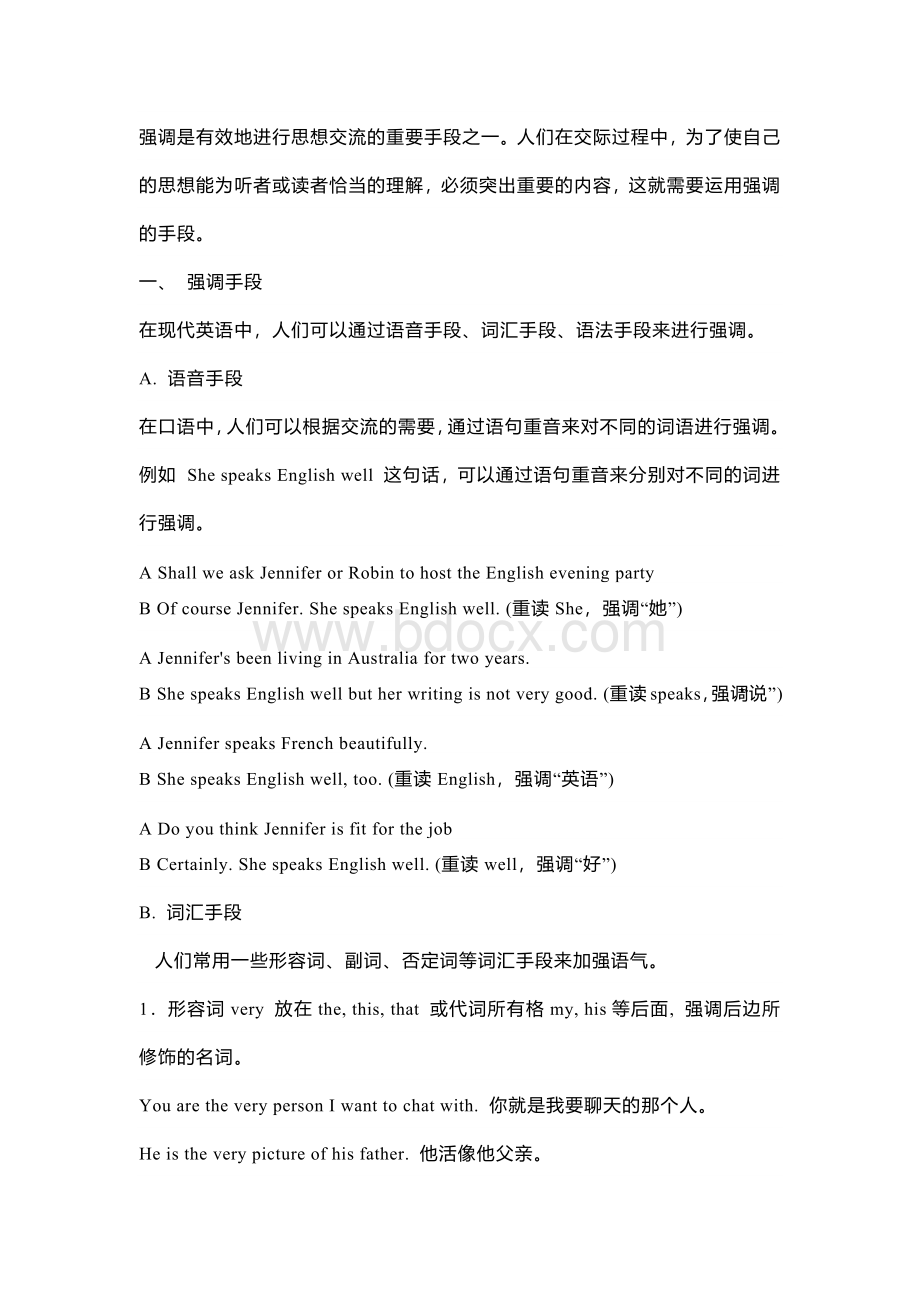高中英语语法知识点:强调句.docx
《高中英语语法知识点:强调句.docx》由会员分享,可在线阅读,更多相关《高中英语语法知识点:强调句.docx(13页珍藏版)》请在冰豆网上搜索。

强调是有效地进行思想交流的重要手段之一。
人们在交际过程中,为了使自己的思想能为听者或读者恰当的理解,必须突出重要的内容,这就需要运用强调的手段。
一、强调手段
在现代英语中,人们可以通过语音手段、词汇手段、语法手段来进行强调。
A.语音手段
在口语中,人们可以根据交流的需要,通过语句重音来对不同的词语进行强调。
例如ShespeaksEnglishwell这句话,可以通过语句重音来分别对不同的词进行强调。
AShallweaskJenniferorRobintohosttheEnglisheveningparty
BOfcourseJennifer.ShespeaksEnglishwell.(重读She,强调“她”)
AJennifer'sbeenlivinginAustraliafortwoyears.
BShespeaksEnglishwellbutherwritingisnotverygood.(重读speaks,强调“说”)
AJenniferspeaksFrenchbeautifully.
BShespeaksEnglishwell,too.(重读English,强调“英语”)
ADoyouthinkJenniferisfitforthejob
BCertainly.ShespeaksEnglishwell.(重读well,强调“好”)
B.词汇手段
人们常用一些形容词、副词、否定词等词汇手段来加强语气。
1.形容词very放在the,this,that或代词所有格my,his等后面,强调后边所修饰的名词。
YouaretheverypersonIwanttochatwith.你就是我要聊天的那个人。
Heistheverypictureofhisfather.他活像他父亲。
Atthatverymomentthepolicemencame. 就在那时警察到了。
2.副词just放在the,this,that或代词所有格my,his等前面,强调the,this,that,my,his所修饰的名词。
ThisisjustthebookIamlookingfor.这就是我在寻找的书。
Heisjusttherightpersonforthejob.他就是适合做这份工作的人。
3.用whatever,whenever,wherever等分别加强what,when,where等词的语气。
Whatisleftoverisyours.剩下来的是你的。
--Whateverisleftoverisyours.剩下来所有的都是你的。
Whendidyoufindtimetodoit你什么时候有空做这事?
--Wheneverdidyoufindtimetodoit你究竟什么时候有空做这事?
Whereareyougoing你到哪里去?
--Whereverareyougoing你究竟到哪里去?
Whocanthatbe那会是谁呢?
hoevercanthatbe那究竟会是谁呢?
4.副词possibly用于否定句或疑问句情态动词cancould后,加强否定或疑问的语气,有“无论如何,不管怎样”的意思。
Wecannotdoit.那件事我们不能做。
--Wecannotpossiblydoit.那件事我们无论如何也不能做。
Hecan'tforgetit.他不会忘记此事。
--Hecan'tpossiblyforgetit.他无论如何也不会忘记此事。
Couldheagree他会同意吗?
ouldhepossiblyagree难道他会同意吗?
5.副词simply用于加强语气,表示“真正,的确,非常,简直,完全”等意思。
Itisbeautiful.这很美。
--Itissimplybeautiful.这的确是美。
Ican'tgosuchstupidbehavior.我不能接受如此愚蠢的行为。
Isimplycan'tgosuchstupidbehavior.对这种愚蠢的行为我实在忍受不了。
6.副词out,up,over等加强语气。
①副词out放在介词短语的前面, 指“较远”的地方,如郊区或远方农村等。
Iamlivinginthecountry.我住在乡下。
--Iamlivingoutinthecountry.我住在乡下。
Wewillsailtotheisland.我们将出海前往该岛。
--Wewillsailouttotheisland.我们将出海远航,前往该岛。
②副词up经常与go,run,walk,come等动词连用,由远及近地“从某处来”,“到某处去”。
Astrangercametomeandaskedtheway.一个陌生人向我走来问路。
--Astrangercameuptomeandaskedtheway.一个陌生人走到我跟前来问路。
Pleasebringthethingstomyoffice.请把这些东西拿到我办公室来。
--Pleasebringthethingsuptomyoffice.请把这些东西拿到我办公室来。
③副词over经常与go,run,walk,come等动词连用,强调跨越一段距离。
Iwillgotohisofficeandhaveatalkwithhim.我要去他办公室和他谈谈。
Iwillgoovertohisofficeandhaveatalkwithhim.我要去他办公室和他谈谈。
7.将onearth,intheworld,inheaven,underthesun等短语放在what,when,which,who,where,how等词的后面,加强语气。
Whendidyousendtheemailtohim?
你什么时候发的电子邮件给他?
--Whenonearthdidyousendtheemailtohim?
你究竟是什么时候发电子邮件给他的?
Whatdoyoumeanbysayingso你这么说是什么意思?
--Whatinheavendoyoumeanbysayingso?
你这么说到底是什么意思?
Wherecouldhebe他可能在哪里?
--Whereintheworldcouldhebe他究竟在哪里?
8.用反身代词表示强调。
Youcangothereyourself.你自己可以去那里。
Thepresidenthimselfwillchairthemeeting.总统将亲自主持这个会议。
Iamastrangerheremyself.我自己在这里也是个陌生人。
9.much,far,byfar,still,even,agreatdeal,alot放在形容词或副词比较级的前面,用来加强语气。
Thisbuildingismuchlargerthanthatone.这幢楼房比那幢楼房大得多。
Hiscompositionisfarbetterthanmine.他的作文比我的作文好多了。
Thatwouldbeagreatdealbetter.那就更好了。
注意:
byfar要放在最高级或带the的比较级前,但如果比较级前面无定冠词,byfar放在比较级前后均可。
Heisbyfarthetalleststudentintheclass.他是班上最高的学生。
Itisbyfarthelongerriverofthetwo.这是两条河中较长的一条。
Thisisbetterbyfar.这个要好多了。
10.用重复某一个单词来表示强调。
It'svery,veryunkindofyou,isn'tit你非常非常不友善,不是吗?
Wewaitedandwaited,butnothinghappened.我们等来等去,但什么事也没发生。
Ihaven'tseenhimforyearsandyearsandyears.我已经好几年没见到他了。
11.用notasingle,notabit,notsimply,bynomeans等短语来加强否定的语气。
She'snotintheleastangrywithme.她一点也不生我的气。
Ican'tspeakasinglewordofJapanese.我就连一个日语单词也不会说。
Sheisbynomeansdiligent.她根本不勤奋。
比较:
notabit一点也不(=notatall);notalittle非常(=verymuch)
Hewasnotabittired.他一点不累。
Hewasnotalittletired.他非常累。
12.用none来表示强调。
1
Thisisnoneofyourbusiness.这与你丝毫没有关系。
Heisnoneofmyfriends.他决不是我的朋友。
B.语法手段
1.通过改变句子结构或颠倒正常语序的手段来进行强调。
Happyarethosewhoarecontent.知足常乐。
NeverwillChinabethefirsttousenuclearweapons.中国决不会第一个使用核武器。
Acrosstheriverliesanewly-builtbridge.河上有一座新建的桥。
Heroasheis,hestillremainsmodest.尽管他是英雄,他仍然很谦虚。
2.用助动词do,does或did来强调谓语动词。
Docomeearly.一定早点来。
HedoesknowBeijingwell.他的确熟悉北京。
Hedidtellmeaboutityesterday.他昨天的确告诉了我这件事。
3.用修辞疑问句表示强调。
疑问句转用作加强语气的陈述句,称之为修辞性疑问句。
肯定的修辞疑问句其意义相当于强调的否定陈述句;而否定的修辞疑问句其意义则相当于强调的肯定陈述句。
Isn'titamodernschool难道这不是一所现代化的学校吗?
(=Itisreallyamodernschool.)
Cananyonedoubtthetruthofhisstatement谁能怀疑他陈述的真实性?
(=Surelynoonecan woulddoubtit.)
Aren'tyouashamedofyourself难道你不惭愧吗?
(=Youshouldbeashamedofyourself.)
Whodoesn'tknowthesunrisesintheeast谁不知道太阳从东方升起?
(=Everyoneknowsthesunrisesintheeast.)
一、it引导的强调结构
“Itis+被强调部分+thatwho+句子其他部分”是使用最广的强调句型。
除了谓语动词不能强调外,句子中其它成分,如主语、状语、宾语或宾语补足语都可以用该句型中加以强调。
A.用强调结构强调句子成分
1.强调主语
被强调的主语是人时,可用Itiswas...thatwho...,但如果被强调的部分既包括人又包括物,只能用that。
Heboughtacamerayesterday.
--Itwashethatwhoboughtacamerayesterday.是他昨天买了一架照相机。
Thefamouswriterandhisworkshavearousedgreatinterestamongthestudents.
--Itisthefamouswriterandhisworksthathavearousedgreatinterestamongthestudents.在学生中引起极大的兴趣的正是这位著名作家以及他的作品。
注意:
强调“I”时谓语动词的变化形式。
ItisIwhoamtoblame.
Itismewhoistoblame.是我该受到责怪。
(非正式文体)
2.强调宾语
Shehelpedmeyesterday.
--Itwasmethatwhomshehelpedyesterday.昨天她帮助的人是我。
Theyoftentalkabouttheschoolandtheteachers.
--Itistheschoolandtheteachersthattheyoftentalkabout.他们经常谈论的是学校和老师。
3.强调宾语补足语
Weelectedhimchairmanofthemeeting.
--Itwaschairmanofthemeetingthatweelectedhim.我们选他是做会议的主席。
Wepaintedthewallwhite.
Itwaswhitethatwepaintedthewall.我们把墙漆成的是白色。
4.强调状语
英语中的状语种类很多,一般都可以用Itiswas...that...来强调。
①时间状语
HelefthishometownforTaiwaninhisteens.他十几岁时就离开家乡去了台湾。
--ItwasinhisteensthathelefthishometownforTaiwan.他是在十几岁时离开家乡去台湾的。
Heletoutthesecretaftertheguesthadgoneaway.客人走后,他说出了秘密。
--Itwasaftertheguesthadgoneawaythatheletoutthesecret.是在客人走后,他才说出了秘密。
提示
如果强调由not…untiltill引导的时间状语时,要注意否定前移。
Hedidn'treturntohishometownuntilafterliberation.
--Itwasnotuntilafterliberationthathereturnedtohishometown.他是解放后才回到他家乡的。
②频率状语
Hecomestoseemeonceinawhile.
--Itisonceinawhilethathecomestoseeme.他现在是偶尔来看看我。
③地点状语
Thecaraccidenthappenedinthisstreetyesterday.
--Itwasinthisstreetthatthecaraccidenthappenedyesterday.昨天就是在这条街上发生了汽车事故。
④方式状语
Theytookcareoftheirsickmotherbyturns.
--Itwasbyturnsthattheytookcareoftheirsickmother.他们轮流来照看生病的母亲。
⑤目的状语
Hegotupearlytocatchtheearlybus.
--Itwastocatchtheearlybusthathegotupearly.是为了赶早班车,他才起得很早的。
⑥原因状语
Theycouldnotcrosstheriverbecausethewaterhadrisen.
--Itwasbecausethewaterhadrisenthattheycouldnotcrosstheriver.正是由于水涨了,他们没有渡过河去。
提示:
在强调结构Itiswas...that...中,要用because来引导原因状语从句,不用since或as。
(见第11章状语从句)
⑦其他状语
Thetailormadeasuittomyownmeasure.
--Itwastomyownmeasurethatthetailormadeasuit.裁缝是按我自己的尺寸做了一套衣服。
⑧withwithout复合结构
“withwithout+名词代词+其他成分”这种结构,也可以放在Itiswas...that中,成为被强调的部分。
Hewaswaitingforhissonatthegate,withanumbrellainhishand.
--Itwaswithanumbrellainhishandthathewaswaitingforhissonatthegate.他是手里拿着一把伞在门口等待着他的儿子。
Shefeltverynervous,withtheteacherstandingbesideher.
Itwaswiththeteacherstandingbesideherthatshefeltverynervous.是有老师站在她旁边,她才感到很紧张的。
B.强调句与定语从句、状语从句等其他句型的区别
有时强调句在形式上和定语从句、状语从句很相似。
我们除了从意思上进行区分外,还能根据强调句结构特点来进行判断,如能去掉Itwas...that...后,句子仍然通顺,就是强调句。
Itwasattherailwaystationthatwefirstmet16yearsago.
是在火车站我们16年前第一次相逢。
(强调句,强调地点状语attherailwaystation)
Itwastherailwaystationwherewefirstmet16yearsago.
这是我们16年前第一次相逢的火车站。
(定语从句,where是关系副词,在定语从句中做地点状语)
Itwasinthisstreetthatthecaraccidenthappenedtheotherday.
前几天发生汽车事故的就是在这条街上。
(强调句,强调地点状语inthisstreet)
Itwasthisstreetwherethecaraccidenthappenedtheotherday.
这是前几天汽车事故的那条街。
(定语从句,where是关系副词在定语从句中做地点状语)
Itwasatmidnightthathegothomeyesterday.
他昨天是半夜到家的。
(强调句,强调时间状语atmidnight)
Itwasmidnightwhenhegothomeyesterday.
昨天他到家时已是半夜。
(when引导的是时间状语从句,it是代词,指时间)
C.强调句的一般疑问句和特殊疑问句
1.强调句的一般疑问句基本句型是:
IsWas+it+that+句子其他成分?
Didheseeyouintheofficejustnow?
--Wasitintheofficethathesawyoujustnow?
他见你的地方是在办公室吗?
Doesheoftengotothelibrary
Isittothelibrarythatheoftengoes他经常去的地方是图书馆吗?
2.强调句的特殊疑问句的基本句型是:
特殊疑问词+iswas+it+that+句子其他成分
WhendidyoufirstgototheGreatWall?
--WhenwasitthatyoufirstwenttotheGreatWall?
你究竟什么时候第一次去长城的?
Wheredidyougolastnight
--Whowasitthattoldyouaboutit究竟是谁告诉你这件事的?
Whydidyoukeepsilentatthemeeting?
Whywasitthatyoukeptsilentatthemeeting?
你究竟为什么在会上保持缄默?
3.含有情态动词强调句的疑问句结构:
①一般疑问句基本句型是:
情态动词或助动词+it+be+被强调的部分+that+句子其他成分?
Couldhebekilledathome 他是在家被杀的吗?
--Coulditbeathomethathewaskilled 他被杀的地方会是在家里吗?
Mightsheleaveherkeysintheoffice 也许她把钥匙丢在办公室了
--Mighttibeintheofficethatsheleftherkeys?
也许她把钥匙丢在办公室了
②特殊疑问句基本句型是:
特殊疑问词+情态动词或助动词+it+be+that+主语+句子其他成分
Wheremighttheaccidenthappen?
--Wheremightitbethattheaccidenthappened?
可能是在什么地方发生这个事故的?
Whocanitbeintheofficenow?
--Whocanitbethatisintheofficenow?
现在还在办公室里的会是谁呢?
二、what引导的强调结构
用“what从句+be+被强调成分”或“被强调成分+be+what从句”表示强调。
Johnwantsagoodrest.约翰想要好好休息一下。
--WhatJohnwantsisagoo